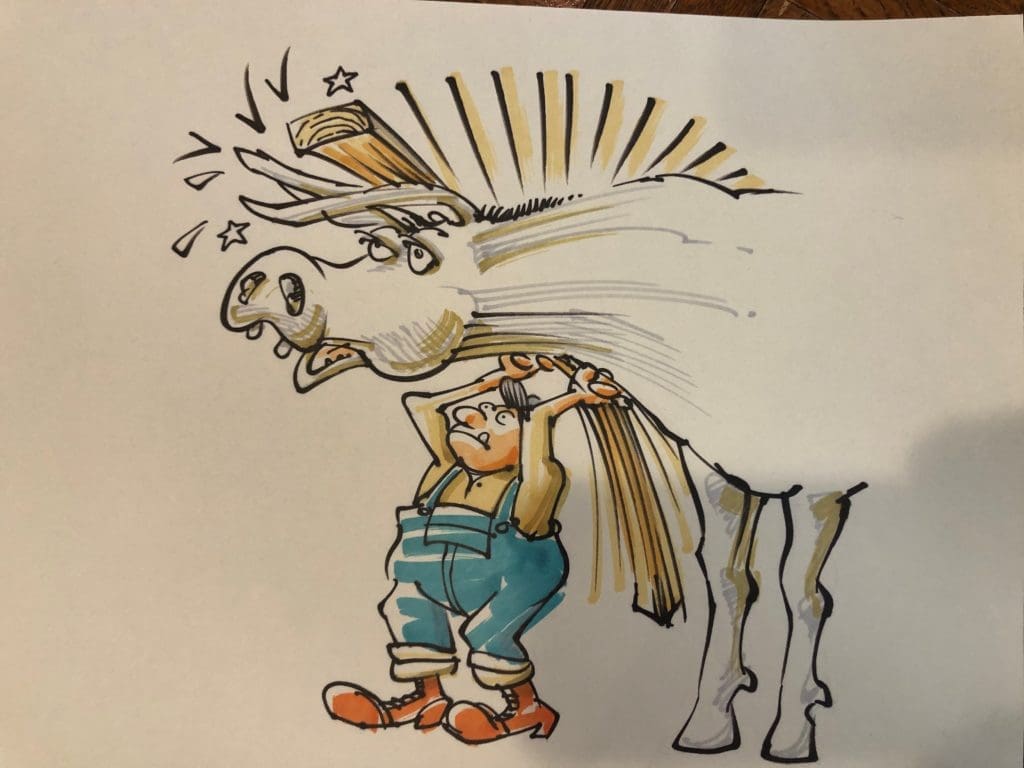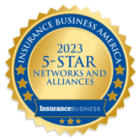Iroquois Group CEO and President Laurie Branch joins us in the studio again. She regales us with stories of carrier and agency relationships during her tenure at Iroquois. What did Iroquois do when our independent agencies were backed into a corner? She also sets us up to envision what the next decade will look like for Iroquois Group. Join us on the journey.
Edwin K. Morris (3s):
Welcome to the trusted advisor podcast brought to you by Iroquois group. Iroquois is your trusted advisor in all things insurance. I’m Edwin K. Morris. Today we welcome back Laurie Branch. Laurie Branch is the CEO and president of the Iroquois group. After spending four years working in brand management for Proctor and Gamble, Laurie joined the Iroquois group in 1984. Since that time, the network has grown tremendously, increasing from 50 member agencies in two States to over 2000 in 41 States. I know you recently graduated with a doctorate in business, correct?
Laurie Branch (44s):
I did, in management. A PhD in management from case,
Edwin K. Morris (46s):
Did that bring you any worthwhile advantages in the business? Were there things that were going on in school that were like, wow, I’m going to do this.
Laurie Branch (55s):
The biggest thing that it brought to me was the idea that you can held two contrary ideas in your head at the same time and not have your head explode. That there might be alternative viewpoints out there that are just as well thought out and just as well argued. And they come to a completely different conclusion and that opens you up for all kinds of things, right? Suddenly you can relook at everything you do and ask, is there an alternative perspective that I could or should be taking here just to learn more about what I’m, what I’m working on.
Edwin K. Morris (1m 24s):
You’re not trying to get to a level of consensus where everybody has to have the same head nod, but at least you’re, you’re opening up the door to be permeable to more data, different perspective. Is that kind of how you’re using it?
Laurie Branch (1m 37s):
That’s an, that’s an excellent characterization of it, which is, and the minute you do that, you suddenly get a whole new world opened up to you because where you have, we all have this thing called confirmation bias, which if we already think something, we tend to look only at data or opinions that confirm exactly what we already thought. When you give that up,
Edwin K. Morris (1m 56s):
What do you mean, that doesn’t work? I thought that worked out great.
Laurie Branch (1m 59s):
Well, it does in the moment. Longer term, you might miss out on things. And so being able to confront that confirmation bias and say, Hmm, you know, there’s room for alternative opinions here. Why don’t we hear them out? I think that has strengthened Iroquois significantly. The other thing that it did was I already had a really strong curiosity and it just fed it.
Edwin K. Morris (2m 20s):
I bet it did. Yeah. Cultural aspect, you know, that ethos for Iroquois, being that, that you’re open to diverse thought has to also bring in what we talked about earlier is that level of trust, because of if someone in an organization feels that they’re going to get stepped on as soon as they open their mouth versus not, they’re more apt to be engaged and involved.
Laurie Branch (2m 44s):
Right. And what you’re, if you’re, if you’re looking for better ideas out there, you can’t go out with the best idea off, right off the bat, because there’ll be no better ideas. So you have to go out there with the idea that you think you’ve got a pretty good solution, but maybe there’s something different or better out there. As soon as your people in your organization know that you’re really looking for the better solution, not looking to validate your solution. It becomes a whole different story
Edwin K. Morris (3m 9s):
The old my way or the highway concept. I mean, that is such an antiquated mentality.
Laurie Branch (3m 14s):
A lot of people still go by that, right? Which is if the CEO or the top management thinks this is the way it’s gotta be, then you know, we’re just going to suck it up and do it their way.
Edwin K. Morris (3m 22s):
You talked about one of the aspects of the lifelong learner by the sounds of it. When you learned this about the predictability, the forecasting, I want to ask you, where do you forecast one, the industry and two, Iroquois?
Laurie Branch (3m 35s):
Well, the industry, when I first came into it, was fascinating because it was the 1980s and carriers hated agents and agents hated carriers. And we had this cute little running video. It was high tech at the time, and it was a video of slides that continually played at the trade show. And one of the slides is my favorite. And there’s an agent with a huge two-by-four about to whack the head of a donkey. And the donkey is labeled carriers. We’ve come a long way since then. That’s what I’m going to say. But at the time, the carriers were very confrontational and adversarial. So that was a time in 1984, I think it was, there was a Forbes article where continental, the head of continental insurance company, which was a very big company at the time, said we’re going to shoot the stragglers every year, which is the bottom 10% of our independent agency force.
Laurie Branch (4m 25s):
We’re going to disconnect. Yep. And we’re going to cut them off and, and keep going forward with only the top 90%. And eventually we will cull out all those terrible agents. That doesn’t feel really good if you’re on the agent side, it doesn’t feel like, it does not feel like they’re rooting for your success. They’re looking to find a reason to cut you. And so agents were up in arms against that. And there were also was the threat of direct writers and direct writers are people like state farm, at the time metropolitan was direct writer. They were announcing to the world that they were going to eat the lunch of the independent agent because their agents were more directed and more focused and, and were better salesmen. As it turns out, they did not eat independent agents’ lunch, which is wonderful And something we predicted at the time when we bet on Iroquois and the independent agency system.
Laurie Branch (5m 11s):
People felt backed into a corner. And when agents are backed into a corner, you get a type of behavior that you don’t really want to see exactly. You get sort of the rat trapped in the corner. And so what Iroquois did at that time was say, we’ve got your back. And the idea was that they might be able to cut off one or two small agencies in Western New York or New York state. But if 50 of us band together, then suddenly we’re forced to be reckoned with. And, and it was more about clout and power dynamics than it was about a sound business principle. It later became a really sound business principle that allowed us to partner with our carriers, as opposed to fight with our carriers. That change happened in the late eighties, early nineties.
Edwin K. Morris (5m 50s):
And that took it from a transactional Allstate where your value was only transactional. And you made it relation, relationships. What a beautiful way to go. I mean, that, that just makes more sense in the long run anyway.
Laurie Branch (6m 4s):
Well, just as people mature, companies mature. As the environment shifts and changes around you, if you can recognize that and shift your behavior to take advantage of those environmental shifts, then you’re going to be much better off. And luckily Iroquois was able to do that. We partner with our carriers now, tremendously, we speak with them weekly. We know what their appetites are, where they want to grow, what they’re trying to accomplish. And then we translate that to what can we bring to the party that will help them accomplish those objectives. It makes a big difference. On the agency side, the same thing, you know, are you trying to grow your agency? Are you looking to perpetuate your agency? Are you looking to bring your son or daughter into the agency? What are you trying to accomplish?
Laurie Branch (6m 46s):
And then again, because it’s a relationship, we look to support them in whatever direction they want to go. And it’s worked out really well.
Edwin K. Morris (6m 53s):
What’s the 10 year goal for Iroquois that is kind of the moonshot? What, what are, where do you want to go? Where, where do you want to end up? What’s the vision?
Laurie Branch (7m 4s):
Keep growing at a consistent and sustainable rate where we’re, where our service and our product and what we provide, which is the strong relationships between carriers and agencies, where that doesn’t denigrate while we grow. And so we expect to be able to grow continuously at 15% to 20% somewhere in there over the foreseeable future. That’s something that we are staffed to do. We’ve got the systems in place to support. You know, one of the things we offer is a trusted advisor in the field. Well, those don’t just come along every day. You’ve got to look pretty hard to find the right person, our regional manager, to put in the field who can connect with the agency. Who’s been in their shoes, who knows what they’re going through and also connect with the carrier on the other side so that they can basically translate and match the needs of both to achieve everybody’s objective.
Laurie Branch (7m 54s):
Those people are hard to find. And so we spend a lot of time cultivating them and then growing them once we bring them on board. Yeah.
Edwin K. Morris (8m 2s):
Isn’t this podcast part of your contribution to help build relational understanding and value in your membership?
Laurie Branch (8m 10s):
Absolutely. One of the things that a family business allows you to do, it allows you to invest without having to explain to somebody why you’re investing or what you expect that return to be, or when you expect that return to come in play. And that allows you to do things like hire a social, a director of digital media when you’re not even sure where that job is going to go and what that need is, but you’ve got a sense that it is out there and that you do need to address it. And so one of the things we’ve done is taken that leap and hired somebody just to manage our digital marketing. And that person is deciding where to take it. I think it’s going to be a fantastic opportunity for the person and a tremendous advantage for the company.
Laurie Branch (8m 50s):
But again, it’s because it’s a family business you can afford to say, well, let’s give it a shot.
Edwin K. Morris (8m 54s):
And you’ve got more creativity, more liberty to find adventure and find things that you think might fit well. You’ve got more liberty to experiment,
Laurie Branch (9m 5s):
Experiment and to fail. I think one of the best things about Iroquois is that we fail. We’re willing to say, Oh, that horse just died. Get off it. It doesn’t matter if you’re in the middle of the street and we’re going to get off that horse and move on. And, but there’s no, there might be an after action report. Could we have seen this coming? Should we have seen this coming? Most of the time it’s like, Nope, you wouldn’t have known unless you tried it, but you don’t have that latitude in large companies, corporate environments, or I would say in private equity firms or firms owned by private equity now, because they’re looking for a determined to return by a term determined date and experimentation with the possibility of failure has a lot of downside.
Laurie Branch (9m 47s):
Whereas in the family business, it’s like, Oh, that’s a vacation I’m not going to take.
Edwin K. Morris (9m 52s):
Well, I want to say thank you very much for sharing your expertise and your history. Thank you very much for being here, Laurie Branch.
Laurie Branch (9m 59s):
Well, this was a lot of fun. Thank you, Edwin.
Edwin K. Morris (10m 4s):
Thanks for listening to this edition of the trusted advisor podcast brought to you by Iroquois group. Iroquois, your trusted advisor for all things insurance, and remember get out of the office and sell. This program was recorded live at the Cohen multimedia studio on the grounds of Chautauqua institution. I am Edwin Kay Morris, and I invite you to join me for the next edition of the trusted advisor podcast.



